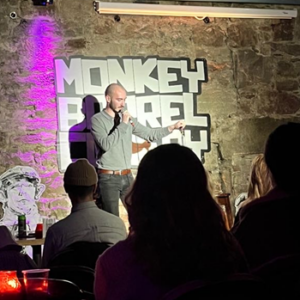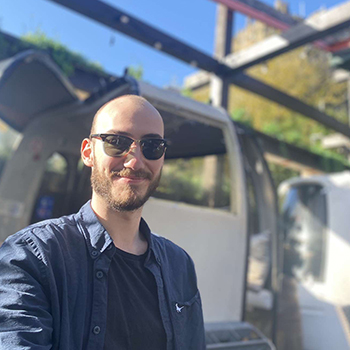MBChB student Joe Bulman explores the phenomenon of the doctor turned comedian.
 Robin Williams (as the now iconic fictional funny-doctor Patch Adams) once declared, when his character was finally brought to justice for practising medicine without a licence, that “If we’re going to fight a disease, let’s fight one of the most terrible diseases of all: indifference”.
Robin Williams (as the now iconic fictional funny-doctor Patch Adams) once declared, when his character was finally brought to justice for practising medicine without a licence, that “If we’re going to fight a disease, let’s fight one of the most terrible diseases of all: indifference”.
I never really got my head around what he meant. From my limited ward-based experience, passing kidney stones or particularly stubborn cases of balanitis seem much worse than indifference. Not to mention the fact that under any normal circumstances, he would be facing five years and an unlimited fine so he probably should have had other things on his mind.
But his powerful monologue calling for medical students to continue his work of bringing humour and joy to an apparently grumpy profession does ring true and is being enacted by a surprisingly expansive roster of doctors turned comedians.
Of course we’ve all read the sanctimonious droning of Dr Adam Kay in This Is Going To Hurt, and the current cohort of fifth years had the pleasure of gleaning some wisdom from Dr Stefania Licari: a brilliant up-and-comer on the British comedy scene during fourth year induction. But it can’t just be me that was surprised to learn that Dr Paul Sinha was a GP and thirteen-time Edinburgh Fringe performer before taking his quizzing talents to The Chase?
Stateside, meanwhile, The Hangover star Dr Ken Jeong was graduating from Chapel-Hill Medical School. Monty Python launched the career of Dr Graham Chapman and even TikTok talent Dr Simon Brodkin cut his teeth as an SHO in Manchester. Another digital age comedian – Youtuber Dr Rohin Francis – still finds the time to hold down a career as a consultant cardiologist! By the way, Francis’ alma-mater St George’s London is the clear winner when it comes to turning students away from medicine and onto comedy. They can also claim Sinha, Taskmaster’s Dr Mike Wozniak and, of course, the legendary Dr Harry Hill.
As a medical student who has spent more than his own fair share of late nights in dimly lit Edinburgh comedy clubs trying to eke laughs out of small gatherings of bored-looking strangers on hastily erected folding chairs, the knack that medicine seems to have for producing generations of joke-merchants piqued my curiosity. What is it about the learned profession that tees open mic-ers up for a career on the circuit?
The answer I’m sure we’d all like to reach for is the medic’s unparalleled understanding of the human condition, right? The empathy and perception we honed over years of SEAM discussions means we can dissect right to the nub of any social issue, subvert the premise and communicate it back to an audience as clearly as we would if we were teaching inhaler technique in an OSCE. Or maybe it’s something more ignoble? Is the need to stand-up and be heard a product of medical arrogance and a holier-than-thou self-assurance? Are these comedy legends just seeking the same validation they got from grandma on A-Level results day years earlier, and a career in comedy is their only hope at chasing that dragon? Last, but certainly not least, is the obvious explanation: the coping mechanism. Gallows humour has been practised at morning handovers for time immemorial and must have provided (at least some of) the above household names with a few half-decent anecdotes.
There is probably a case to be made for each of these explanations, but I don’t think we should worry too much about where the pattern of funny doctors emerged or what it says about the psychology of those doing the job itself. What I like to focus on is the fact that of all the professions, the stats are showing that medics seem to do ‘funny’ the best. For me, the longevity and success of Edinburgh Medics’ very own revue and musical demonstrate that whatever the explanation for it, medics make good performers. They’re funny and honest and blunt and cynical but also compassionate and genuine…for the most part. At the very least, we seem to be able to make ourselves laugh.
We all say in our interviews that medicine is our opportunity to marry an interest in science with a chance to help people, so I don’t think Patch Adams was on to much when he preached about buttoned-up doctors and their tendency towards indifference because, from the brief cohort study of the British comedy scene I’ve performed so far, that doesn’t seem to be the case. I think Dr Graeme Garden (of Radio 4’s: Sorry I Haven’t Got a Clue) put it much better than Patch when he was asked about his change of career: “It’s an interesting question – whether you’ve contributed more to the vast store of human enjoyment by doing comedy or by being a doctor”. I like to think that this is the best explanation. Medics, on the whole, want to in some way contribute to a bit of human enjoyment, whether a tight five minutes on stage or a (tighter) 10 minute consultation. In a lot of ways it’s a shame all these comedians will likely never head back to the wards. Based on how good they are at stand-up, I bet they weren’t half-bad doctors.



